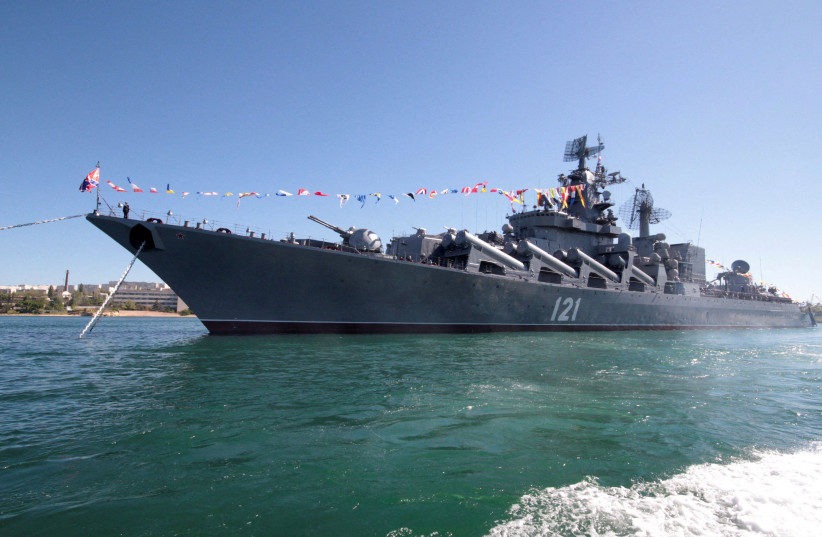by Herb Keinon
Everyone is wondering what has happened to the vaunted Russian army. What has happened to Moscow’s military might?
 |
UKRAINIAN SERVICE members stand on an infantry fighting vehicle,
near the town of Izium, recently liberated by Ukrainian Armed Forces, on
Tuesday.
(photo credit: GLEB GARANICH/REUTERS)
|
This week’s stunning turn of events in the war in Ukraine was head-spinning, reflected in dramatic headlines in the media around the world.
“Ukraine is turning the tide against Russia,” declared one. “Ukrainian victory shatters Russia’s reputation as a military superpower,” shouted a second. “Russia withdraws more forces from northeast Ukraine as Kyiv presses advance,” read a third.
Seven months after the start of Russia’s invasion of Ukraine, the tide seemed to turn in the war, as Ukrainian forces registered victories in the northeast. In a symbolic action that seemed unimaginable a few months ago, Ukrainian President Volodymyr Zelensky visited the liberated town of Izium on Thursday, just 14 km. from the front.
With its bold counteroffensive, Ukraine regained thousands of square kilometers of territory, and pushed Russian forces out of countless towns and villages – including the strategic railway hub of Izium.
If the world was surprised at the initial difficulties the Russians faced when they invaded Ukraine in late February, if it was impressed by the Ukrainian ability to repel Russian advances on Kyiv and on April 2 force a Russian withdrawal from the capital, and if it was shocked by the sinking 12-days later of the Moskva, the flagship of Russia’s Black Sea fleet, then it was completely stunned by this current counteroffensive and the recent turn of events.

Moreover, these developments came at a most auspicious time, shortly before the weather in Europe is to change and tens of millions of Europeans will feel for themselves – in terms of rationing and blackouts – the impact of Moscow’s decision to cut off its gas supplies in retaliation for European sanctions.
While the coming Russian-induced energy crunch might lead some on the continent to question the wisdom of Europe’s strong backing of Ukraine, the recent victories will strengthen the argument of those saying that not only was this backing morally justified, but it was also incredibly helpful to the Ukrainians, enabling the Ukrainian army to fight back and – perhaps – repel the Russians.
From Washington to Wellington, Berlin to Beijing, statesmen, politicians, and military experts are wondering what has happened to the vaunted Russian army. What has happened to Moscow’s military might? And how will Russia’s underwhelming showing in Ukraine and its current losses affect geopolitics?
How will Russia's losses be felt in the Middle East?
NOWHERE IS the question of what has happened to the feared Russian Bear at the forefront of decision-makers’ minds as it is in the Middle East, an area of intense competition for influence between Russia, the US and China.
Ever since its move into Syria in 2015 to prop up Syrian dictator Bashar Assad, Russia has been a permanent physical fixture in the neighborhood – a big fixture and an important fixture that other countries took into account when determining policy.
Even before 2015, Russia was a force in the region, using military and economic aid, as well as diplomatic support, to project power throughout the region. This influence increased significantly over the last dozen years amid a perception in many regional capitals that the US was an unreliable ally intent on leaving the Mideast.
This perception was created by Washington’s abandonment of longtime ally Egyptian president Hosni Mubarak in 2011, by its determination – despite the opposition of its regional allies – to strike a nuclear deal with Iran, and by its withdrawal and threatened withdrawals of troops from all over the region, from Iraq to Syria and Afghanistan. This has led various countries in the region to want to hedge their bets and get closer to the Russians.
And the influence soared into another sphere altogether after Russia’s military intervention in Syria.
Over the last decade, ties flourished between Russia and Egypt, as well as between Russia and Saudi Arabia. The Saudi and Egyptian calculations were clear. If the US was unreliable, or if it linked arms sales to various human rights demands, then they should look for a partner that does not have such demands, and that conducts a values-free foreign policy.
Thus, they looked to Russia and China.
Both Egypt and Saudi Arabia inked deals, for instance, for a Russian state company to build nuclear plants – construction of such a plant began in Egypt in July – and they both moved to develop closer military and defense ties with Moscow.
Russia’s influence in the region explains why the Mideast countries – including Israel – were reluctant to come out strongly against Russian President Vladimir Putin when he first invaded Ukraine. They were afraid of the damage Putin could do to their national interests if he wanted to.
But now things are changing.
One of the various reasons given for Putin’s decision to invade Ukraine was to deal a blow to American dominance in the world, to project power and reassert Russia’s role as the dominant superpower. But the opposite is taking place, and rather than looking strong and invincible, rather than projecting power, Russia’s setbacks are projecting weakness and making it look spent and unorganized. Nothing illustrates this more than the sudden dependency of Russia – the world’s second-largest exporter of arms – on Iranian-manufactured drones.
In the meantime, regional countries such as Saudi Arabia, Egypt and the Gulf states, which still feel threatened by Iran and had recently looked to Russia for arms, now will look elsewhere, as the Russian war machine fumbles in Ukraine.
This will lead to a possible realignment, with nations casting their eyes toward Beijing and Washington. For weeks there have been rumors that Chinese President Xi Jinping will soon make a visit to Saudi Arabia. Such a visit would be highly symbolic, signaling that the Chinese are eager to seize an opportunity afforded by Russia’s troubles in Ukraine.
The poor Russian performance in Ukraine will also likely lead countries in the region to try to improve ties with the US.
When US President Joe Biden visited Saudi Arabia in July, he appeared to go there begging the Saudis to increase oil production to bring down global oil prices. Back then it appeared that the US needed the Saudis much more than the Saudis needed them.
Now things are changing. The Saudis, who were then cozying up to the Russians, just as they were distancing themselves from the US, still face the same threat from Iran and its proxies that they always have. But now the Russians look far less attractive, something that could lead them to take steps on their end to improve ties with the US.
It may also move them closer to Israel. If the Saudis still feel they can’t rely on the US, if Russia is not what they thought it was, then – as the Iranian threat still looms large for the Saudis, even more so if a new Iranian nuclear deal is signed – this could lead to more Saudi overtures toward Israel.
The Russian setbacks in Ukraine also present problems for Iran. Russia and Iran are partners in an anti-Western alliance, with Iran keen on seeing a weakened US presence in the region and less reliance by Mideast countries on the US. A badly weakened Russia, however, does the opposite, and will create enhanced dependence on the US by regional countries, which is bad for Iran.
And then there is the situation in Syria.
It is from Syria that Russia has been able to project its power throughout the Mideast for the last seven years. Its military losses in Ukraine, however, have forced Russia to draw down its considerable presence in Syria, something that will have an impact on Syria, Iran and Israel.
While in the past Russian forces were key to Assad staying in power, as Russia removes troops from Syria, Assad will become more dependent on Iran. And if Iran gets more and more entrenched inside Syria, this will invite even more Israeli activity there.
Some argue that this will only increase the likelihood of an Israeli-Russian confrontation over the skies of the country. Remember as well that the desire to maintain the deconfliction mechanism that has been in place in Syria since 2015 – a mechanism that prevents accidental Russian-Israeli clashes – was one of the main reasons that kept Israel from fully supporting Ukraine and condemning Russia, at the start of the war.
The recent Russian setbacks in Ukraine make it more imperative than ever for Russia not to get involved in any military confrontation elsewhere. That is good news for Israel, which continues – according to foreign reports – to strike at Iranian and Hezbollah assets inside Syria. One of Israel’s concerns was that to limit these attacks, the Russian might embed their forces with Iranian units to prevent Israeli action, knowing that Israel would not willingly attack Russian positions. The last thing Moscow needs right now, however, is another military entanglement anywhere in the world.
At the same time, as Russia’s prestige is taking a hit in Ukraine, it has become all the more important for it to retain its control of Syria as a base for its activities in the Mideast. Having a presence in Syria allows its presence to be felt throughout the region.
There is, however, another way for Russia to make its presence felt throughout the region, and that is something Jerusalem very much doesn’t want to see: using its base in Syria, as well as a presence it still maintains in Libya, to be a disruptive force in the region. If Putin fails miserably in Ukraine, he may be tempted to take revenge on the West by harming its interests, sowing instability, and disrupting the world order elsewhere – first and foremost in the Middle East.
Herb Keinon
Source: https://www.jpost.com/international/article-717286
No comments:
Post a Comment